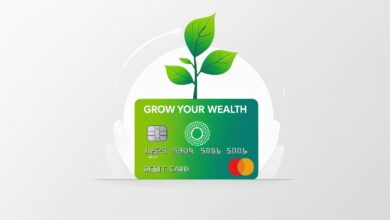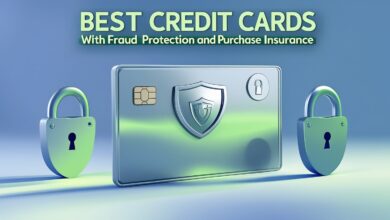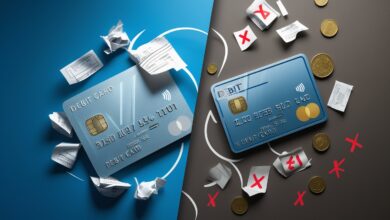Common Credit Card Mistakes to Avoid as a Beginner

Getting your first credit card can feel like a big milestone. It’s a step into adulthood, financial independence, and the world of credit scores. But as exciting as it is, credit cards can also be a little tricky. Used wisely, they’re great tools for building credit and making purchases more convenient. But if you don’t handle them properly, they can lead to financial stress, debt, and even damage to your credit score.
If you’re new to credit cards, don’t worry! We’re going to walk through some of the most common mistakes beginners make and how you can avoid them. A little knowledge can go a long way in keeping you out of trouble and setting you up for financial success.
1. Only Making the Minimum Payment
One of the biggest mistakes beginners make is only paying the minimum amount due on their credit card bill. The minimum payment is usually a small percentage of your total balance—sometimes as little as 2% or 3%. While it might seem like a good deal, it’s actually a trap.
When you only pay the minimum, the rest of your balance continues to accumulate interest. And trust me, credit card interest rates are no joke! They can be as high as 20% or more. If you’re only paying the minimum, you could end up taking years to pay off a single purchase and spending way more than you originally planned.
How to Avoid This Mistake:
Try to pay off your full balance every month. If you can’t, at least pay more than the minimum to reduce interest charges.
2. Maxing Out Your Credit Limit
Another common mistake is using your entire credit limit. Let’s say your credit card has a $1,000 limit, and you spend all of it. Even if you plan to pay it off, using your full limit can hurt your credit score.
This is because of something called credit utilization. Credit utilization is the percentage of your credit limit that you’re using. Experts recommend keeping it below 30%. If you’re maxing out your card, it signals to lenders that you might be relying too much on credit, which can make you look like a risky borrower.
How to Avoid This Mistake:
Try to keep your balance low—ideally below 30% of your limit. If your limit is $1,000, aim to keep your balance under $300.
3. Missing Payments
Missing a credit card payment is one of the worst mistakes you can make. Not only will you be charged a late fee, but it can also hurt your credit score. And if you miss a payment by more than 30 days, it could be reported to the credit bureaus, which can stay on your credit report for years.
Late payments also mean interest starts piling up, making it even harder to catch up. Before you know it, a small missed payment can turn into a huge financial headache.
How to Avoid This Mistake:
Set up automatic payments or reminders on your phone so you never forget a due date. Even if you can’t pay the full amount, always make at least the minimum payment on time.
4. Applying for Too Many Cards at Once
Once you get your first credit card, it can be tempting to apply for more. Maybe you see a store credit card with a big discount, or you get a pre-approved offer in the mail. But applying for too many cards in a short period can hurt your credit score.
Every time you apply for a new credit card, the lender does a hard inquiry on your credit report. Too many hard inquiries in a short time can lower your score and make lenders think you’re desperate for credit.
How to Avoid This Mistake:
Take it slow. Start with one credit card and build good habits before applying for another one. If you really need a second card, wait at least 6-12 months before applying.
5. Not Checking Your Credit Card Statements
A lot of people assume their credit card statements are always correct, but mistakes happen. Sometimes there are incorrect charges, duplicate transactions, or even fraudulent activity. If you’re not checking your statements, you might not notice until it’s too late.
How to Avoid This Mistake:
Make it a habit to review your credit card statement every month. If you notice a mistake, report it to your credit card company right away. Most companies have a dispute process to fix errors.
6. Ignoring Your Credit Score
Your credit score is like your financial report card. It affects your ability to get loans, rent an apartment, or even get a job in some cases. Many beginners ignore their credit score, not realizing how important it is.
How to Avoid This Mistake:
Keep an eye on your credit score by checking it regularly. Many credit card companies offer free credit score monitoring. If your score drops, try to figure out why and make adjustments to improve it.
7. Using Credit Cards for Everything
While credit cards are convenient, they shouldn’t be used for every single purchase. Some people treat them like free money and swipe them for things they don’t really need. Before they know it, they’re drowning in debt.
How to Avoid This Mistake:
Use your credit card wisely. Stick to purchases you can afford to pay off each month. If you’re spending more than you can handle, switch to using cash or a debit card for everyday expenses.
8. Taking Out a Cash Advance
A cash advance lets you withdraw cash from your credit card, but it’s one of the worst things you can do. Why? Because cash advances come with high fees and immediate interest charges—sometimes even higher than your regular purchase APR.
How to Avoid This Mistake:
Only use your credit card for purchases, not cash withdrawals. If you need cash, use your debit card or emergency savings instead.
9. Not Reading the Fine Print
Credit card agreements are full of terms and conditions that most people don’t read. This can lead to surprises, like unexpected fees or high interest rates.
How to Avoid This Mistake:
Take the time to read the terms of your credit card. Know what fees apply, what your interest rate is, and what perks or rewards you might be eligible for.
10. Cancelling a Credit Card Too Soon
If you decide you don’t want a credit card anymore, you might think closing it is a good idea. But canceling a credit card can actually hurt your credit score. That’s because it lowers your total available credit, which increases your credit utilization ratio.
How to Avoid This Mistake:
Unless there’s an annual fee you can’t afford, it’s usually better to keep the card open—even if you don’t use it much. If you must close a card, pay off the balance first and try to open another line of credit before closing the old one.
Final Thoughts
Credit cards are powerful financial tools, but only if you use them wisely. Avoiding these common mistakes will help you build good credit, stay out of debt, and make the most of your card’s benefits. The key is to be responsible: pay your bills on time, keep your balance low, and always read the fine print.
By being smart with your credit card, you’ll set yourself up for a healthy financial future. So go ahead, use your credit card—but use it wisely!



